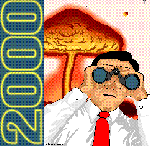 |
|
I was amongst the many people who made a good living when we all spent our time and other's money hunting down the Y2K bug. |
|
|
|
The Agony Column for August 22, 2002
Commentary by Rick Kleffel
08/22/2002. The numbers are ominous. Maybe I should run this column on a different date.
 |
|
I was amongst the many people who made a good living when we all spent our time and other's money hunting down the Y2K bug. |
It's been a scary past couple years in the numbers game. The Y2K bug was possibly the last prop for a boom that had to go bust. Folks in the IT business like myself were busy bees, fighting to prevent a foreseeable apocalypse. Everyone stayed up all night and just held hands, hoping for the best, braced for the worst. I wrote a file to a Unix server at precisely the hour. I was logged in to the VAX, watching batch jobs run on a computer that had undergone a luxury car's worth of patching to ensure it would work even farther past its sell-by date. Nothing happened, except a few fireworks and lots of news coverage. What were we all afraid of?
 |
|
The kind of monsters we're really afraid of -- wrinkle rockers. |
I can sure as hell tell you it wasn't vampires, werewolves, aliens, or serial killers. Though, come to think of it, nobody did any stats on the number and types of murder committed that night. There are probably more than a few sorry nutcases who were aiming for the headline 'Millennium Murderer'. Since I subscribe to the Arthur C. Clarke church of the 2001 millennium, to my mind they had another year to strike and they still blew it. It's too late now, you sorry bastards.
Where none of us feels safe, where everyone knows that they are in imminent, life threatening danger is in the workplace -- if you're lucky enough to have one. Dying is easy; going broke is really scary.
If you're in no danger of having this happen -- or if it's already happened to you and you want to feel that sweet terror once again, you can count on the writers of this world to bring the experience to you first hand, up close and personal. And if you like science fiction, horror, fantasy or mystery genre fiction, you can get a liberal dose of unreality mixed with your stark day-to-day, just to make the transition to poverty easier.
 |
|
Welcome to Stevens County, Washington, where they want to do away with the libraries because they're 'too expensive'. Another in our series of "Count Your Blessings" location shots. |
For reasons that remain mysterious even to me, I've recently been writing up reviews of some of my favorite fiscal science fiction and horror, digging through the archives for nuggets of the impending doom that is even as I write descending slowly upon us all. I've also gone back to the stacks for a bit of research into the ugly reality of it all and brought back the titles that terrified me in the past. Of course, current reality can scare us all just as easily as anything else. Readers have a good reason to be scared. In a small county in upstate Washington, an "antitax" group of citizens is trying to dissolve the counties' libraries. Those who don't read -- and don't want others to read -- are trying to ensure that it can happen here. According to an article in the New York Times, Dave Sitler, a member of the American Heritage party, has obtained far more than enough signatures to place a measure on the upcoming fall ballot to eliminate the Stephens County Rural Library District. '"With all the property I own, I'm probably paying $500 in taxes for the library, and that's just $500 wasted on something we don't need," Sitler said. Now that's scary.
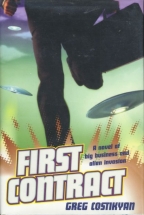 |
|
Silicon Valley bigwigs were first unseated by aliens, who play the Spaniards to our Aztec-level culture in Greg Costikyan's 'First Contract'. |
Readers who require the re-assurance of fantasy to leaven the fiscal fright but still want to look at what happens when the money goes away need look no farther than Greg Costikyan's Y2K present to the world, 'First Contract'. The premise is quite simple. The aliens arrive, and they are the Spaniards to our Aztec civilization. Overnight, every bit of technology is obsolete. We can get it all cheaper, faster and better from the aliens. Costikyan gets in a lot of excellent jokes at the expense of capitalism American-style, and shows us what happened when the bubble burst just before it actually did so. He does an excellent job at personalizing the whole process in the character of Johnson Mukerjii, who is transformed from a rich internet inventor/investor into a poverty-stricken man on the street in short order. This transfiguration from rich to poor is funny but at the same time quite frightening and true to life. Costikyan has obviously spent time in the Silicon Valley. He knows the intricacies of tech start-ups and how they fall down. He nails the people, from the rich wives to the fickle investors. He maps a decline and fall every bit as classic as that of Rome, and far more pertinent to the current reader. It's a well-written good time that strikes uncomfortably close to home.
 |
|
James Lovegove's 'Days' is a trade paperback original novel and a disturbing look at consumerism. |
English writer James Lovegrove has made something of a specialty in fiscal fiction. His novel 'Days', nominated for the Arthur C. Clarke award, is an excellent examination of the power of money and finance in the lives of his workaday characters. 'Days' takes place in a huge "giga-store" of the near future. Well, at least it was the near future when the novel was written. Recently a store has opened that claims to be a "giga-store". However, it's not as big as Days, nor is it as exclusive. One hopes as well that it's not as sinister. 'Days' takes place on Frank Hubble's last day working for the corporation. Hubble is a security specialist, a 'ghost' who becomes functionally invisible to catch criminals. Linda and Gordon Trivett are about to have their first shopping experience at Days. As a ghost in Days, Frank has lost his ability to see himself in the mirror; he's defined exclusively by what he can purchase. The Trivetts, desperate to achieve entry to the exclusive Days, have saved for five years. As Lovegrove reveals the fiscal gulfs between his characters and the owners of Days, a sinister bunch of seven brothers, the depths of economic separation become Lovecraftian. The yearning for definition becomes an addiction to spending, something that Days certainly encourages. Lovegrove polishes a deeply wounded soul at the heart of 'Days'. It's an intense, upsetting experience that speaks directly to the income gap, the presence of great poverty in the midst of great wealth, and the ever-increasing acquisitiveness of the rich. Lovegrove's science fictional conceits are done with a light touch. He uses the science fiction genre to stretch the fiscal frontiers just far enough to make the edges dissolve in an abyssal blur. It's an effective tactic. 'Days' is a powerful, quiet, but deeply disturbing look at the interiors of the consumer's heart.
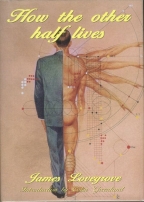 |
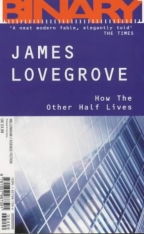 |
|
The rich -- or the mightily lucky -- amongst us are the only ones likely to own this edition of Lovegrove's look at the cost of capitalism. |
The rest of us can thank Gollancz for this very cool Ace-Double style edition. The flipside is Graham Joyce's 'Leningrad Nights'. |
'How the other half lives', Lovegrove's PS Publishing novella pulls a bitter thorn from the heart of the ultra-rich. William Ian North moves amounts of money as 'vast as tectonic plates'. But he does so at a price, by extracting a payment in pain. While it starts off written in the simple, limpid style of a P. G. Wodehouse story, 'How the other half lives' rapidly reveals a rotting heart of evil. Lovegrove skewers, splays and dissects the power his character wields so confidently, using prose so sharp that it cuts deeply into the heart of a culture that can even conceive of such a human. But Lovegrove isn't just after revenge; he reaches for and manages to achieve just a bit of redemption. 'How the other half lives' is also available as half of an 'Ace Double' style series of paperbacks from Victor Gollancz called Binary. We can send our thanks to Gollancz for making the PS Publishing titles available in a much cheaper format nearly as cool as the original issue.
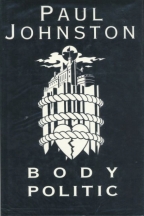 |
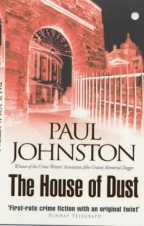 |
|
Paul Johnston's first novel of a run-down, dirt-poor future. Forget the high tech, we're hoping for a hot shower. |
The latest Paul Johnston novel manages to get a bit of something over to Edinburgh, but it's a pretty unpleasant something. |
Readers looking for a glimpse of their economic future may want to avoid Paul Johnston's grim but gripping Quintillian Dalrymple novels. Johnston's vision of the future makes even well-intentioned socialism look very bad, just as bad as it looked in the 1980's and 1990's in Eastern Europe. Johnston's novels are set in Edinburgh in the year 2020 when global warming has made the city temperate enough to support a year-round arts festival. The city has declared itself an independent city-state, based on the ideals set forth in Plato's 'The Republic'. Corruption has set in, the citizens live in hardship, and even the perfect city manages to find itself the scene of a crime. The first novel, 'Body Politic', lays out the scenario in depressing detail. Shortages, rationing, a state sponsored sex clinic and year-round lottery to keep the locals happy combine to create an unpleasant present. The striking thing about Johnston's future is that it is so much like the present -- only shabbier and poorer. High technology can't hack it in Johnston's cheaped-out version of tomorrow. As the novels progress, Johnston wisely moves the action outside of the city-state of Edinburgh. The latest novel in the series, 'The House of Dust' manages to see a bit of the future finally creeping in to Edinburgh, but it's as tainted by poverty as the rest of his world. Liquor, money, the blues, dirt, heat, showers -- that's what matters in Johnston's future.
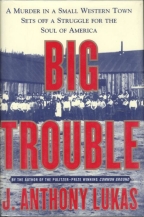 |
|
It's non-fiction, but every bit as gripping as a novel. Watch Corporate America's first muscle-flex result in murder. Teddy Roosevelt, Pinkerton Detectives and Clarence Darrow share the stage. |
For those who want their fiscal fear strictly on the historical side, so utterly realistic that it requires over 100 pages of notes, bibliography and index, there is only one choice. That would be 'Big Trouble', by J. Anthony Lukas. Lukas, who wrote the Pulitzer-prize winning 'Common Ground', here tells the story of a murder in a small western town that leads to a battle between the rich and the poor, the unions and the mining companies, Pinkerton Detectives and the police. Lukas is in epic territory and he tells his story with gripping detail. At times, 'Big Trouble' reads like a real-life analogue for 'The Alienist'. Clarence Darrow, Oliver Wendell Holmes and Teddy Roosevelt play a part in a story that should turn every warm-blooded reader into a card-carrying socialist. At it's heart, 'Big Trouble' tells the story of how the mining companies helped scotch the snake of organized, respectable socialism from this country once and for all. No matter what your economic or political inclinations, 'Big Trouble' tells a fascinating tale in a lively manner.
By the time you've finished reading all these books, like a bad spell cast by an evil enchantress in a disturbing fairy, whoosh, all your economic woes are gone. We're on the road to recovery. Worry no more! If the fear of losing your job starts to become too pressing, if the competition for your scant paycheck becomes too fierce, you can always make a career of reading!
Thanks,
Rick Kleffel